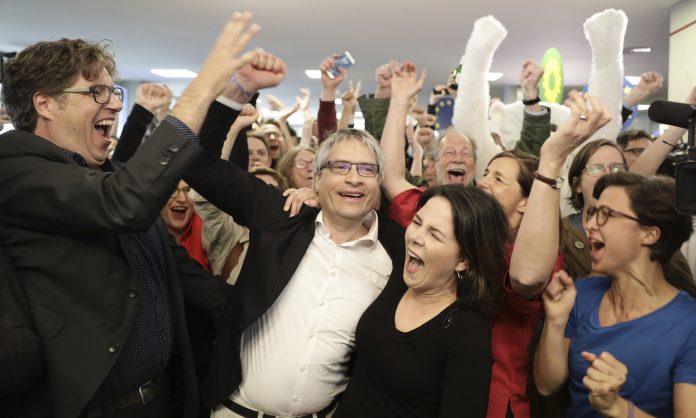
Germany’s governing parties were headed for their worst post-World War II showing in a nationwide election on Sunday amid discontent with their stuttering performance over the past year, with the Greens surging to second place in the European Parliament vote amid increasing concern about climate change.
Projections for ARD and ZDF public television, based on exit polls and partial counting, put support for Chancellor Angela Merkel’s center-right Union bloc at around 28% and the Social Democrats, their partners in an often-fractious “grand coalition” of what have traditionally been Germany’s biggest parties, around 15.5%. Five years ago, they took 35.4% and 27.3% respectively.
The Greens powered past the Social Democrats into second place, increasing their score to around 21%, the projections showed. That is nearly double their 10.7% showing in 2014.
It was an indifferent evening for the far-right Alternative for Germany, which celebrated increasing its presence in the European Parliament but looked set to fall short of its showing in Germany’s 2017 national election. The party was seen taking about 10.5%, up from 7.1% five years ago.
It wasn’t immediately clear whether the outcome would further destabilize Merkel’s national governing coalition, following long-running speculation that its end could be hastened by poor results Sunday.
The Social Democrats appeared on course for another disastrous result in a state election in Bremen, a longtime stronghold, also held Sunday. Three further state elections in eastern Germany await this fall — as does as a previously agreed review of the coalition’s work, halfway through the scheduled parliamentary term.
Merkel has said she won’t run for a fifth term in the next national election, which isn’t due until 2021, but questions have swirled over whether the government will last that long. It took six months to form that government after Germany’s last election, and its image was tarnished by infighting last year.
Merkel largely stayed out of this campaign, which was a first test for Annegret Kramp-Karrenbauer, her successor since December as leader of the Christian Democratic Union party. Kramp-Karrenbauer told supporters in Berlin that “this election result does not do justice to the expectations we have of ourselves as a major party.”
She said that the government hasn’t yet “given the convincing answers that citizens in Germany demand,” conceding that climate protection and adapting to “the digital world” had been weak points.
In the days before the election, a prominent YouTuber racked up millions of views with a video skewering the CDU’s policies on climate change and other issues. Kramp-Karrenbauer promised that the party will “roll up our sleeves.”
Senior Social Democrats, meanwhile, sought to head off speculation about the future of the party’s often-criticized leader, Andrea Nahles. Vice Chancellor Olaf Scholz, a Social Democrat, said that “calling for personal consequences won’t get us anywhere.”
Scholz congratulated the Greens, who appear to have gained at his party’s expense. He said it’s clear that “we need a really clear response to the question for humanity of climate change” and pledged that his party won’t make the “wrong compromises.”
Katrin Goering-Eckart, one of the Greens’ leaders in Berlin, told The Associated Press that it was “a sensational result.”q















